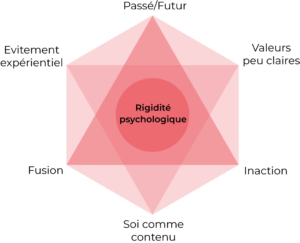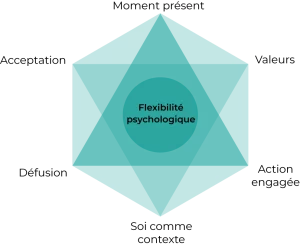1. WHAT IS ACT THERAPY ?
ACT therapy derives its name from English for Acceptance and Commitment Therapy.
This name comes from the two pillars of therapy: accepting what we cannot control and engaging in actions that bring us closer to what is best for us. This aims to promote and develop cognitive flexibility, i.e. the ability to adapt to situations in an appropriate and healthy way.
Through the functional analysis of the patient, the therapist will identify the sources of suffering related to cognitive rigidity, maladjusted schemas and dysfunctional beliefs, and bring, through cognitive and emotional exercises, new nuances and strengths on which to build to move forward.
2. WHAT IS ACT THERAPY BASED ON ?
Researchers who participated in the development of ACT illustrate its bases with the Hexaflex model, which represents the six domains that influence the spectrum between flexibility and psychological rigidity. Our mind tends more easily to move towards rigid functioning, what may have worked in the past becomes the only solution in the future, which diminishes resilience and crystallizes inefficient functioning in the long term.


Each domain represents a skill or a set of skills that can be developed independently and in association with others and that allow flexibility to be developed.
The relationship to time, coming back to the present moment
We often tend to project ourselves in our thoughts, to ruminate on the past or anticipate the future. These thoughts overemphasize things outside of our control or that we cannot change. They also prevent us from focusing on the present moment and acting according to the present situation. Through exercises based on mindfulness, we learn to re-anchor ourselves in the present and not to dwell so much on thoughts.
The relationship to experience, being in acceptance
A recurring element in the testimonies of people in psychological suffering is the feeling of exhaustion, of fighting without ever getting out of it and not moving forward. This need for control results either in maladaptive behaviors or in avoidance, both of which risk making the situation worse in the long term.
ACT proposes to change this mode of operation through an experiential approach: accepting to live with situations, however unpleasant they may be, and not trying to control what cannot be. Try a “being” rather than a “doing” mindset when “doing” is not effective. This state allows you to focus on what is really important in yourself and in your actions. This is not resignation, but kindness to oneself and the reality of human experience.
The relationship to thoughts, start defusion
Thought fusion is believing thoughts as a reflection of reality. They are interpreted in a literal way, even, if not especially, when these are uncontrollable intrusive thoughts. If the thought “I suck” crosses my mind, it must be true.
Defusion will then be the mental process that puts thoughts back in their place, that is to say simple mental events. I’m not bad, I had the thought that I was bad, but by seeing it for what it is, I can challenge that thought. It is just a series of words or mental images, and I can make the effort to verify this thought, its veracity, its relevance and detach myself from the effect it might have.
The relationship to the Self, as context rather than content
Our mind tends to perceive the Self, the individual, as content, that is to say the accumulation of its traits and experiences, a fixed mass defined by simple and immutable labels: “I am someone one of confidence”, “I am a bad person”, “I am unfaithful”, etc… These labels facilitate the work of our brain, but their rigidity blocks our evolution because it does not take into account the context. This can lead to self-fulfilling prophecies and a poor self-image that is hard to change.
The Self as context leads the individual not to perceive himself as a state, but as a set of processes that vary over time and situations. Our actions and decisions are influenced by many external and internal factors, and these change over time.
If I have been unfaithful in a past relationship, it could be due to a dysfunctional relationship, a lack of communication or self-confidence, a drunken night out. Understanding the context helps to understand the actions in order to reproduce them or modify them in order to come closer to what is important to us.
Personal Values, clearing the way
Values are the moral compass that is meant to guide our actions. Each individual has their own values. Acting in accordance with one’s values makes it possible to feel good in one’s life and to build a solid self-image. Conversely, when our actions are contrary to our values, they bring regret, bitterness and a poor self-image.
ACT helps identify and consolidate the most important values for each individual to inform decision-making. The values will serve as a guide in the face of changing emotions and thoughts that can be intrusive. When in doubt, referring to the values will help inform decision-making and action.
Decision-making by the Action taken
Once the values have been defined, comes the moment of behavioral activation, the move to action. The individual defines life goals or values (achieving a goal or getting closer to their values) and putting in place committed actions to get closer to these goals. This process makes it possible in particular to get out of the depressive spiral.
It is during this stage that many obstacles can be encountered. Internal obstacles will be overcome through acceptance and demerger. Actions can bring up unpleasant thoughts or emotions, but by stepping back and keeping the goal in mind, the long-term benefits are brought to the fore. External obstacles are overcome through problem solving, a skill that develops by practicing finding solutions in accordance with values.
Engaged action develops a sense of accomplishment and creates a momentum of commitment.
The ultimate goal of developing these skills is to be able to adapt to life events, and to no longer be a prisoner of one’s thoughts. Return to the present moment to act in accordance with your values rather than avoiding the experience. We thus find control over the areas that can be influenced, and an acceptance of what cannot be so as not to let these elements stop us.
3. WHAT IS THE USE OF ACT THERAPY ?
ACT therapy allows you to get out of situations where you feel stuck, helpless and locked in your thoughts.
It helps to regain a sense of advancement and progression in one’s life by promoting adaptability and resilience.
This therapy has proven its effectiveness in fighting anxiety and depression, helping to reduce stress, manage chronic diseases and quit smoking.
Many studies are underway to establish more precisely the effectiveness of this therapy on the entire spectrum of mental health, but the skills it helps to develop, and which are found in other therapies already validated , suggest that ACT has a very broad field of action from which many people, even without mental illness, could benefit.
